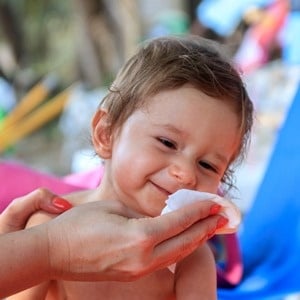
Soon the Western Cape will be living off the dregs of its freshwater reservoirs, and taking a daily shower may be a thing of the past. Many people are concerned about cleanliness and maintaining their personal hygiene.
Some have considered and others have already started using waterless methods to replace their daily showers. Many have already stockpiled wet wipes and waterless sanitiser.
We asked two skin experts whether showering every day is a necessity and if these substitutes are suitable or not.
Showering: A social cultural norm
Dr Suretha Kannenberg, a dermatologist at Netcare Kuilsriver, said: "We're used to showering daily and this is because it is a social cultural norm, but there isn't really a physiological need for one to shower every day.
"Many people don't shower every day, but this depends on factors, like climate, the type of work one does and how much physical activity one engages in."
Dr Kannenberg added that it's perfectly fine if you shower once or twice a week. Generally, we shower or bath to remove dirt from our bodies.
The skin's flora
"We have a microbiome consisting of different bacteria and viruses, which are basically harmless and live happily on our skin. When we wash too often, we tend to disturb the balance of this microbiome and it takes some time to recover.
"Many people in Europe skip a day or two when washing and while many may think ill of the practice, it's beneficial for those who do not wash every day, like those who are prone to recurrent skin infections," said Dr Kannenberg.
Beware the allergens
If you are prone to skin infections, you may need to pass on the chemical solutions and waterless options, and wash with soap and water instead.
Dr Kannenberg added that many wet wipes contain a chemical which is meant to preserve the wipes, but it could be an allergen. Even sensitive wet wipes are said to contain the chemical, Methyllisothiazolinone (MI) or Methylchloroisothiazolinone (MCI).
The quick wash
Washing with a few litres of water is completely doable. Dr Kannenberg advises that we don't use face cloths, sponges or loofahs because they absorb too much water, and could become a breeding ground for bacteria and fungi, mainly because we can't keep things as clean as we used to.
"If we use a light soap, which doesn't foam too much, and simply wash with our hands, we would be able to clean ourselves quite well. There is quite a bit one can do with one or two litres of water," said Dr Kannenberg.
Dermatologist and lecturer at the University of Cape Town, Dr Rannakoe Lehloenya, echoed Dr Kannenberg's sentiments.
No harm done
"Skipping a wash every few days does not harm the body in any way, apart from hands, of course, as these can transmit germs.
"The major reason we need to wash frequently is due to the smell and this is mainly a result of bacteria breaking down body secretions, like sweat. It takes a few weeks for the dead skin cells to visibly accumulate," said Dr Lehloenya.
Your skin would naturally shed by itself and often doesn't need much assistance from you, but if your work is hard, manual labour or you lead an active lifestyle you may want to clean up a bit.
When it comes to hygiene, using things like waterless sanitisers and certain wet wipes in sensitive areas could cause immense discomfort and may lead to conditions like groin infections.
Be mindful of young skin
When it comes to taking care of our babies' and children's skin, Dr Lehloenya said that excessive washing for babies and young children does more harm than good.
"An important hygienic considering in babies is to avoid irritation of the skin by prolonged exposure to urine and stools – both of which are corrosive.
"The eroded skin then serves as a conduit for entry of bugs. It is important for caregivers to maintain adequate hand hygiene, especially when preparing food," said Dr Lehloenya.
When it comes to using wet wipes or waterless solutions on babies and young children's skin, Dr Lehloenya advised that because these products differ in their composition, they also have differing potential to damage the skin.
Dr Lehloenya said, "It's wise to check the ingredients and use the gentlest forms for babies.
"When it comes our skin's health and our personal hygiene, do not compromise on hand washing or disinfecting, especially after ablution and when preparing food. Also, take care of open wounds and damaged skin adequately."
How will you take care of you and your family's personal hygiene while saving water at the same time? Share your thoughts, ideas and experiences with us by emailing healthnews@health24.com and we may publish them. Please indicate if you would like to remain anonymous.
Image credit: iStock




 Publications
Publications
 Partners
Partners











